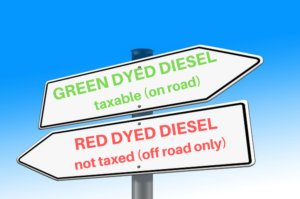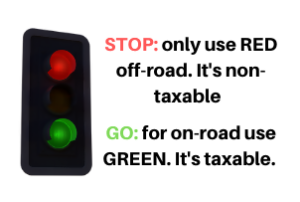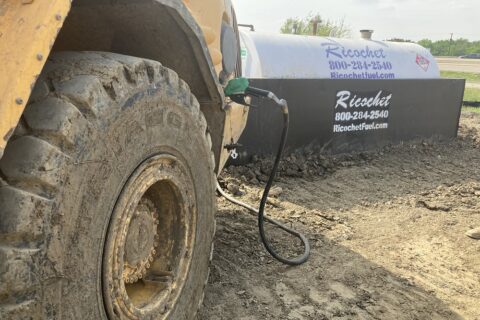Dyed Diesel – Frequently Asked Questions

At Ricochet Fuel Distributors, we get questions about off road fuel, or dyed diesel, almost every day. That’s probably because people want to save money on their fuel costs. But they don’t want to get in trouble. So, that’s where the confusion begins. Let’s start with our most common questions.
Green Diesel – When Do You Use It?
Diesel that’s dyed green is for on-road use. It’s taxed. So, if you’re driving on government roads and highways built with tax dollars, you should be using green fuel. Not red.
Red Diesel – When Do You Use It?
Diesel that’s dyed red is for off-road use only. That means you can use it for construction equipment, heating oil, and agricultural purposes. Basically, you can use it in diesel-powered vehicles or equipment as long as you’re not driving on roads and highways. Red dye diesel can also be used to run refrigeration units on trailers known as “reefers.” But the vehicle it’s attached to must use green-dyed, taxable, diesel.

Just remember – stop and think before you use red-dyed diesel. If you’re trying to save money by using it on the road, you could get a hefty fine.
If you’re driving on the government roads and highways, you have to use green-dyed diesel.
When and Why is Diesel Dye Added?
Fuel gets dye at the very beginning of its journey long before it arrives at the fuel distributor like Ricochet Fuel or the pump. Federal and State governments require the refiner or terminal provider to add either red or green dye. That way, it’s easy to identify. And, it’s hard to get around paying fuel tax. With dyed-diesel, tax authorities can check visually, and use a black light to detect residuals in the engine.
One thing to keep in mind is that even though the tax may affect your wallet, dyes don’t change the efficiency of the fuel in any way.

Other Names for Dyed Diesel
Another confusing thing about dyed diesel fuel is it’s called by a lot of different names. Here are the ones we hear the most:
- Farm Diesel
- Off-Road Diesel
- Tax-Free Diesel
- Untaxed Diesel
- Red Diesel
- Red Dyed Diesel
- Dyed Diesel #1 (higher grade)
- Dyed Diesel #2 (lower grade)
When Can You Use Dyed Diesel Fuel?
If you have a vehicle or equipment that you only use off government roads and highways, there’s a good chance you can use tax-free diesel. For example, if you have a construction company, you’d use that type of fuel in bulldozers, tractors,
generators, backhoes, skid steers, and cranes. Or if you have a farm, you’d use red diesel for your harvester or combine.

Caution – Dyed Diesel is Flammable
This type of fuel heats up super-fast since it’s designed specifically for big heavy equipment. So, be careful and make sure you know what you’re doing when you use and transport it. Texas especially has strict requirements.
What are the Different Sulfur Levels in Diesel Fuels?
- Ultra-low sulfur diesel (ULSD) is below 15 parts per million. ULSD is necessary for new advanced emission control technologies, and it contributes to particulate matter reductions in the existing fleet of off-road vehicles and equipment. ULSD is cleaner burning but has decreased fuel density, which results in a slightly lower fuel economy.
- Low sulfur diesel is under 500 parts per million. Low sulfur diesel was established in conjunction with the light-duty vehicle standards to maintain the performance of catalytic converters.
- High sulfur diesel is over 500 parts per million. Because of the regulations toward lower sulfur fuels, this is for off-road use only. However, everything is going to ultra-low sulfur diesel.
Should You Get Ultra-Low Sulfur Diesel?
The EPA has been stepping up its efforts to reduce sulfur in all types of fuels, both on-road and off-road. Sulfur is one of the leading causes of air particulates (the black soot in the exhaust from diesel engines). It’s a primary contributor to air pollution. The government began regulating sulfur levels to reduce air pollutants from diesel fuel uses significantly.
Less sulfur is better for the environment and has fewer health risks. But, one thing to know is it’s best if you either regular fuel or ultra-low sulfur because when you mix the two, you could have problems like tank corrosion.
How Long Can Diesel Fuel Be Stored Safely?
You can store dyed diesel for up to a year without additional treatment or testing. With planned storage beyond a year, the enemy is water and dirt entering the fuel through the tank vent, which brings in the air with dirt particulates from the outside. Fuel additives are recommended to prevent the accelerated growth of bacteria, yeast, and algae in fuel tanks. In bulk storage, this treatment also provides for consistency of the fuel’s specification. Treat the fuel with a biocide and an oxidative stabilizer to prevent any growth inside the tank.
Diesel fuel freshness can be checked just by observation for its “brightness” in color. As the fuel ages, the dye fades.
How Does Temperature Affect Dyed Diesel?
Diesel fuel is sensitive to cold temperatures. “Diesel gelling” can occur and starve the engine of fuel. Diesel gelling is when wax crystals form and fall out of the fuel. These wax crystals and ice forming in the fuel begins to clog filters and will prevent equipment from operating.

In extreme weather, where temperatures are 20 degrees F and below, the diesel needs to be treated for winter use. It is essential to ask your vendor if the fuel is being treated for winter use when there is potential for fuel to be affected.
In Texas, we generally don’t get weather below the mid-30s in the winter, so you may not need to worry about gelling. And, above 20 degrees F, there are typically no issues.



